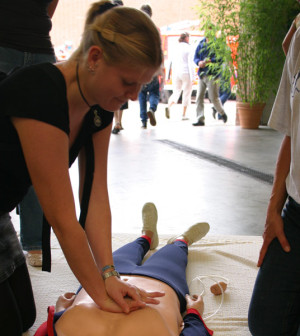- 10 Strategies to Overcome Insomnia
- Could Artificial Sweeteners Be Aging the Brain Faster?
- Techniques for Soothing Your Nervous System
- Does the Water in Your House Smell Funny? Here’s Why
- Can a Daily Dose of Apple Cider Vinegar Actually Aid Weight Loss?
- 6 Health Beverages That Can Actually Spike Your Blood Sugar
- Treatment Options for Social Anxiety Disorder
- Understanding the Connection Between Anxiety and Depression
- How Daily Prunes Can Influence Cholesterol and Inflammation
- When to Take B12 for Better Absorption and Energy
Only 1 in 10 With Heart Failure Sent to Rehab Programs


Cardiac rehabilitation programs offer many benefits to heart failure patients, but only one in 10 are referred to such programs, a new study reveals.
There is strong evidence that cardiac rehabilitation therapy improves heart failure patients’ quality of life and reduces their risk of hospitalization, the researchers noted. The programs include exercise training, education on heart-healthy living and counseling.
The researchers analyzed data from more than 100,000 heart failure patients in the United States who were discharged from hospitals between 2005 and 2014 and were eligible for cardiac rehabilitation programs.
Overall, slightly more than 10 percent of the patients were referred for rehabilitation when they left the hospital. Referral rates did increase during the study period, but remained low.
Younger patients and men were more likely to be referred for rehabilitation than older patients and women. Those who received referrals were also more likely to be prescribed recommended heart failure medications when they left the hospital.
The study is published in the Aug. 25 issue of the Journal of the American College of Cardiology.
“Although we expected some under-referral to cardiac rehabilitation in the heart failure population, the results of this study are startling,” study senior author Dr. Gregg Fonarow, a professor of cardiology at the University of California, Los Angeles, said in a university news release.
Given the benefits of these programs and the rising costs of hospitalizations, “our findings point to the need for better strategies to increase physicians’ and patients’ awareness about the importance of cardiac rehabilitation,” he added.
Fonarow said doctors who are more likely to incorporate state-of-the-art therapies to manage heart failure patients are also more apt to refer them to rehabilitation programs.
“This suggests that raising awareness about the benefits of these programs may be an effective strategy for increasing referrals,” he said.
Other approaches that may get more patients into rehabilitation include increasing insurance coverage and reducing co-payments for such programs, and expanding the responsibilities of home care nurses, physical therapists and other health care providers for more community-based rehabilitation, the researchers suggested.
More information
The U.S. National Heart, Lung, and Blood Institute has more about cardiac rehabilitation.
Source: HealthDay
Copyright © 2026 HealthDay. All rights reserved.










